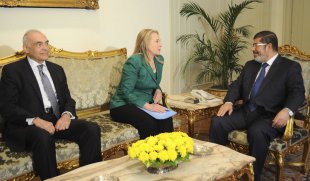JERUSALEM (AP) — A diplomatic push to end Israel's nearly weeklong offensive in the Gaza Strip gained momentum Tuesday, with Egypt's president predicting that airstrikes would end within hours and Israel's prime minister saying his country would be a "willing partner" to a cease-fire with the Islamic militant group Hamas.
As international diplomats raced across the region to cement a deal, a senior Hamas official said an agreement was close even as relentless airstrikes and rocket attacks between the two sides continued. President Barack Obama dispatched Secretary of State Hillary Rodham Clinton to the Mideast from Cambodia, where she had accompanied him on a visit.
"We haven't struck the deal yet, but we are progressing and it will most likely be tonight," Moussa Abu Marzouk said Tuesday from Cairo, where cease-fire talks were being held.
Egyptian President Mohammed Morsi, perhaps the most important interlocutor between Hamas, which rules the Palestinian territory, and the Israelis, said the negotiations between the two sides will yield "positive results" during the coming hours.
In Brussels, a senior official of the European Union's foreign service said a cease-fire would include an end of Israeli airstrikes and targeted killings in Gaza, the opening of Gaza crossing points and an end to rocket attacks on Israel. The official spoke on condition of anonymity because he was not authorized to speak to the media.
Violence raged on as the talks continued. An airstrike late Tuesday killed two journalists who work for the Hamas TV station, Al-Aqsa, according to a statement from the channel. The men were in a car hit by an airstrike, Gaza health official Ashraf al-Kidra said. Israel claims that many Hamas journalists are involved in militant activities. Earlier this week it targeted the station's offices, saying it served as a Hamas communications post.
By Tuesday, 128 Palestinians, including at least 54 civilians, were killed since Israel began an air onslaught that has so far included nearly 1,500 strikes. Some 840 people have been wounded, including 225 children, Gaza health officials said.
Three Israeli civilians have also been killed and dozens wounded since the fighting began last week, the numbers possibly kept down by a rocket-defense system that Israel developed with U.S. funding. More than 1,000 rockets have been fired at Israel this week, the military said.
Late Tuesday, a Palestinian rocket hit a house in the central Israeli city of Rishon Letzion, wounding two people and badly damaging the top two floors of the building, police spokesman Micky Rosenfeld said.
With the death toll rising, the international community stepped up efforts to bring a halt to the fighting that began last Wednesday with an Israel's assassination of the Hamas military chief.
"If a long-term solution can be put in place through diplomatic means, then Israel would be a willing partner to such a solution. But if stronger military action proves necessary to stop the constant barrage of rockets, Israel wouldn't hesitate to do what is necessary to defend our people," Israeli Prime Minister Benjamin Netanyahu said during a joint press conference in Jerusalem with visiting U.N. chief Ban Ki-moon.
Ban condemned Palestinian rocket attacks, but urged Israel to show "maximum restraint."
"Further escalation benefits no one," he said.
Minutes before Ban's arrival in Jerusalem from Egypt, Palestinian militants fired a rocket toward the holy city. Earlier Tuesday, a man identified as Hamas' militant commander urged his fighters to keep up attacks on Israel, even as Israeli airstrikes killed a senior Hamas militant identified as Amin al-Dada and five others in a separate attack on a car, according to Gaza health officials.
Israeli warplanes dropped leaflets on several Gaza neighborhoods asking residents to evacuate and head toward the center of Gaza City along specific roads. The army "is not targeting any of you, and doesn't want to harm you or your families," the leaflets said. Palestinian militants urged residents to ignore the warnings, calling them "psychological warfare."
Clinton was scheduled to meet with Netanyahu in Jerusalem, Palestinian President Mahmoud Abbas in the West Bank and Egyptian leaders in Cairo. Turkey's foreign minister and a delegation of Arab League foreign ministers traveled to Gaza on a separate truce mission. Airstrikes continued to hit Gaza even as they entered the territory.
"Turkey is standing by you," Turkish Foreign Minister Ahmet Davutoglu told the Hamas prime minister in Gaza, Ismail Haniyeh. "Our demand is clear. Israel should end its aggression immediately and lift the inhumane blockade imposed on Gaza."
It was unclear how diplomatic efforts to achieve a cease-fire and stave off a threatened Israeli ground invasion into Gaza were hampered by the hard-to-bridge positions staked out by both sides — and by the persistent attacks. Tens of thousands of Israeli soldiers have been dispatched to the Gaza border in case of a decision to invade.
Residents of Jerusalem ran for cover Tuesday as sirens sounded after Palestinians fired a rocket toward the holy city for the second time since the fighting started last Wednesday.
Rosenfeld said the rocket landed harmlessly in an open area in Gush Etzion, a collection of Jewish West Bank settlements southeast of the city. Last Friday's attempt to hit Jerusalem, nearly 80 kilometers (50 miles) from Gaza, landed in the same area. No one was wounded in either attack.
Jerusalem had previously been considered beyond the range of Gaza rockets — and an unlikely target because it is home to the Al-Aqsa Mosque compound, Islam's third-holiest shrine.
In a sign of the difficulty diplomats will have in forging such a cease-fire, a man identified as Mohammed Deif, Hamas' elusive military commander, urged his fighters to keep up attacks on Israel.
Speaking from hiding on Hamas-run TV and radio, Deif said Hamas "must invest all resources to uproot this aggressor from our land," a reference to Israel.
Deif is one of the founders of Hamas' military wing and was its top commander until he was seriously wounded in an Israeli airstrike in 2003. He was replaced as the de facto leader by Ahmed Jabari, who was assassinated by Israel last week in the opening salvo of its latest Gaza offensive.
The U.S. considers Hamas, which has killed hundreds of Israelis in suicide and other attacks, to be a terror group and does not meet with its officials. The Obama administration blames Hamas for the latest eruption of violence and says Israel has the right to defend itself. At the same time, it has warned against a ground invasion, saying it could send casualties spiraling.
Netanyahu said earlier Tuesday that Israel was exploring a diplomatic solution, but wouldn't balk at a broader military operation.
"I prefer a diplomatic solution," Netanyahu said in a statement after meeting with Germany's Foreign Minister Guido Westerwelle, who is also in the region trying to advance peace efforts. "But if the fire continues, we will be forced to take broader measures and will not hesitate to do so."
Westerwelle said a truce must be urgently pursued, "but of course, there is one precondition for everything else, and this is a stop of the missile attacks against Israel."
The conflict erupted last week, when a resurgence in rocket fire from Gaza set off the Israeli offensive, which included hundreds of airstrikes on militants' underground rocket launchers and weapons' stores.
The onslaught turned deadlier over the weekend, as airstrikes began targeting the homes of suspected Hamas activists, leading to a spike in civilian casualties. Israel sent warnings in some cases, witnesses said, but in other instances missiles hit suddenly, burying residents under the rubble of their homes.
Hamas is deeply rooted in densely populated Gaza, and the movement's activists live in the midst of ordinary Gazans. Israel says militants are using civilians as human shields, both for their own safety and to launch rocket strikes from residential neighborhoods.
Early Tuesday, Israeli aircraft targeted another Hamas symbol of power, the headquarters of the bank senior Hamas officials set up to sidestep international sanctions on the militant group's rule. The inside of the bank was destroyed. A building supply business in the basement was damaged.
Fuad Hijazi and two of his toddler sons were killed Monday evening when missiles struck their one-story shack in northern Gaza, leaving a crater about two to three meters (seven to 10 feet) deep in the densely populated neighborhood. Residents said the father was not a militant.
The conflict showed signs of spilling into the West Bank, as hundreds of Palestinian protesters in the town of Jenin clashed with Israeli forces during a demonstration against Israel's Gaza offensive.
Two Palestinian protesters were killed in anti-Israel demonstrations in the West Bank on Monday, according to Palestinian officials. Separate clashes occurred Tuesday in Ramallah, the seat of the Palestinian government, during the funeral for one of the dead.
Palestinian President Mahmoud Abbas, who lost control of Gaza to Hamas in 2007, now governs from the West Bank. Abbas claims to represent both areas, and there is widespread sympathy among West Bank Palestinians for their brethren in Gaza.
Israel demands an end to rocket fire from Gaza and a halt to weapons smuggling into Gaza through tunnels under the border with Egypt. It also wants international guarantees that Hamas will not rearm or use Egypt's Sinai region, which abuts both Gaza and southern Israel, to attack Israelis.
Hamas wants Israel to halt all attacks on Gaza and lift tight restrictions on trade and movement in and out of the territory that have been in place since Hamas seized Gaza by force in 2007. Israel has rejected such demands in the past.
___
Associated Press writers Hamza Hendawi in Cairo, and Karin Laub and Ibrahim Barzak in Gaza City, Gaza Strip, contributed to this report.




